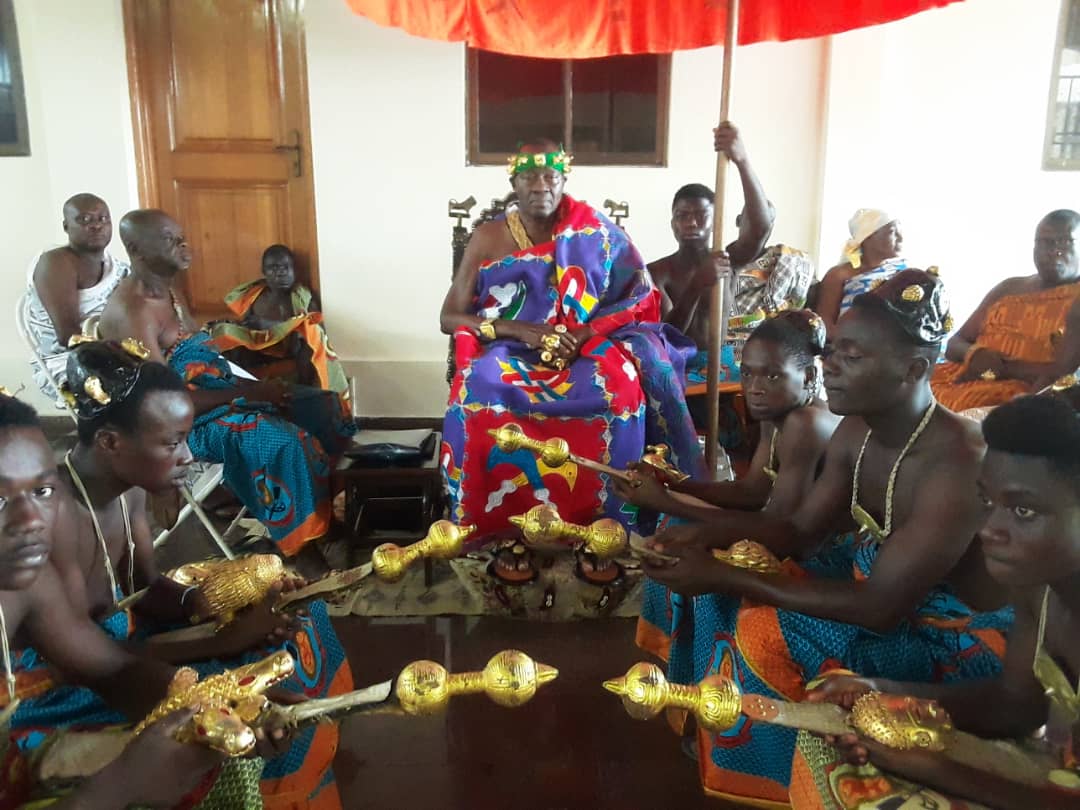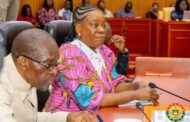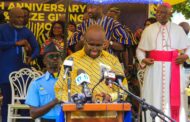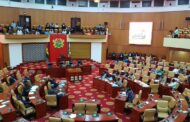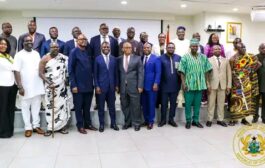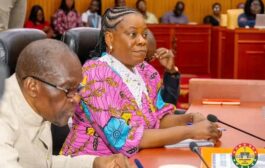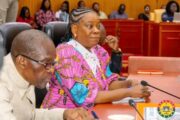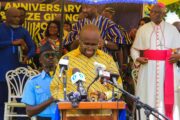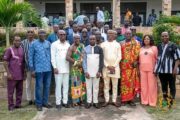The New Juaben Traditional Council is protesting against its exclusion from the Eastern Regional House Chiefs.
A letter written by the Omanhene of New Juaben Traditional Area Daasebre Prof. Emeritus Oti Boateng to the National House of Chiefs described the action as “capricious” the determination and selection of Divisional Chiefs amongst various paramountcies.
Below is the full statement:
PROTESTATION AGAINST THE COMPOSITION OF THE RE-STRUCTURED
EASTERN REGIONAL HOUSE OF CHIEFS:
SEQUEL
This is a sequel to my protestation against the bizarre attempt to exclude the New Juaben Traditional Area from the re-structured Eastern Regional House of Chiefs (ERHC) and more
Particularly the capricious determination and selection of Divisional Chiefs amongst various paramountcies.
It has become necessary as one of the Paramount Chiefs of the ERHC to speak on this new proposal initiated by the President of ERHC without due consultation in order to preserve the hierarchical structure of the Chieftaincy institution.
A. A very crucial matter such as the admission of Divisional Chiefs into a Regional House of Chiefs should be discussed by the whole House with agreement on the modalities of such admissions before any memorandum on the agreed issues is submitted to the National House of Chiefs for further action. The leadership of the Eastern Regional House of Chiefs failed to observe this protocol by bypassing the full House in the submission of the said memorandum to the National House of Chiefs.
B. Minutes of the Standing Committee of the House meeting on 25 May 2020 which decided on this crucial matter contain the following two terse statements: first, “Osagyefuo Amoatia Ofori Panin welcomed all members and thanked them for making time to attend in spite of the short notice given. Nana President informed Nananom that owing to the limited Membership of the House which almost invariably impairs the effective functioning of the House, it had become imperative to add some Divisional Chiefs to the membership of the House” and second, “After a lengthy discussion, Nananom unanimously agreed to provide a list of Divisional Chiefs from their respective Traditional Councils from which a slot due to each Traditional Council shall be selected by the respective President in consultation with the Traditional Council concerned“.
C. The President’s statement did not spell out the specific functions of the House which were being impaired by the limited membership. He had called the meeting to rope in his imperative solution “to add some Divisional Chiefs to the membership of the House.”
Without soliciting for viable alternative solutions. Again his proposal did not indicate any basis for the allocation of the Divisional Chiefs to the House from the various paramountcies in the Region.
The so-called “lengthy discussion” by Nananom referred to in the minutes failed to give the substance of the discussion. The question here is that, in the absence of a properly delineated problem, how do you come out with a precise solution? Yet the Standing Committee came out with “a decision” which was hurriedly sent to the National House of Chiefs in the same week on 29 May 2020 without following the normal practice of referring the matter to the full House for debate.
Daasebre Prof. (Emeritus) Oti Boateng, being the immediate past President with 28 years of experience in the ERHC, is infinitely aware that such crucial matters are always referred to the full House for a final decision. The failure of the President to refer such an important matter to the full House, which could easily provide innovative solutions to any delineated problems, reveals a total lack of transparency and calls into question the real motive behind the move. The letter sent to the National House, therefore, lacked the essential diversity of thought and support from the full House. The letter also failed to justify why paramountcies in the Eastern Region should select the so-called “diverse” numbers of Divisional Chiefs.
This again reveals the arbitrary nature of the allocation. The proposal from the ERHC lacks merit for three important reasons: first, by proposing a solution without delineating the precise problem to be solved; second, by failing to justify the asymmetrical allocation system adopted, and third, by bypassing the full ERHC in the submission of the memorandum to the National House.
D. The leadership of ERHC is reported to have informed the National House of Chiefs that the Omanhene of New Juaben Traditional Area has stated that he did not want any of his Divisional Chiefs to be in the Regional House of Chiefs. This information is news to me since I have NOT spoken nor communicated with the leadership of the ERHC regarding this issue. The fact is, the Omanhene of New Juaben was in London during the period under reference writing a book on the Root-based Development survey conducted in New Juaben in February 2020. I heard about this issue through the President of the National House of Chiefs who brought it to my attention for the first time when the National House was about to take a decision on the matter. At this juncture, I wish to commend the leadership of the National House for making a conference call to the Omanhene in London who categorically denied the above statement attributable to him, to the hearing of the whole House. At that critical moment, the leadership of the ERHC who was also at the august National House meeting could not contradict the Omanhene of New Juaben.
Had it not been this prudent last-minute intervention by the National House leadership aided by our ancestral spirits, which revealed the fabricated lie from the ERHC leadership, New Juaben Divisional Chiefs would have been perpetually disenfranchised from the proposed composition of ERHC. Lying to the National House of Chiefs is an extremely serious offense that a Chief in Ghana could commit as a wilfully perjured individual. One is at a loss of why such a lie should be perpetrated at the highest level of the Chieftaincy forum to push an agenda by hook or crook. Like COVID-19, this unfortunate incident of New Juaben could amplify its ugly wings to all paramountcies in the country whose leadership is considered formidable enough to control. It carves a menacing path threatening to destroy the Chieftaincy institution which must be curbed with the truth and a united front.
Any paramountcy in the country could be so threatened and sacrificed for a hidden agenda.
E. The issue of the principle of allocation is so cardinal to this exercise. All members of the
House needs to be informed of any cogent reasons why the fair principle of equal allocation which had characterized the workings of the House from its inception should be thrown asunder without any justification whatsoever.
The adoption of unequal allocation principle introduces serious bias and asymmetry into the composition of the ERHC without a justifiable rationale. Indeed, the introduction of asymmetrical allocation which gives some paramountcies undue numerical advantage over others is totally repugnant to the spirit and letter of the Chieftaincy Act. This extremely distasteful and arbitrary allocation method also plants a perpetual seed of discord into ERHC which will be difficult to erase.
Above all, it could lead to potentially dangerous unintended consequences to undermine the Chieftaincy institution.
F. Another critical issue to resolve is the role that the Divisional Chiefs will be playing in the ERHC. This has to be debated and accepted by all constituents BEFORE inserting an inclusion clause with an appropriate cap. As you is aware, section 58 of the Chieftaincy
The act stipulates a hierarchical structure of chiefs recognized in the nation as Asantehene and Paramount Chiefs Divisional Chiefs Sub-Divisional Chiefs Adikrofo Others Chiefs recognized by the National House.
The Act clarifies the appropriate privileges and responsibilities accorded each chief based on the hierarchy. The same Act mandates all matters affecting
Paramount Chiefs to be heard at the Regional House of Chiefs rather than at the Traditional Councils. Based on the provisions of the Act, the lower-level chiefs received instructions from the higher chiefs in all aspects of administration.
The communities and Divisional Chiefs have the responsibility to report on the state of affairs of the community to the Paramount Chiefs. Allowing Divisional Chiefs to sit on cases affecting Paramount Chiefs defeats the spirit of the Act and the hierarchical structure of the Chieftaincy institution.
This episode, related to the auto-correlations of previous events, builds an ominous correlogram that threatens the role and authority of Paramount Chiefs in the country. This is a clarion call for all peace-loving citizens of the country to get united with the truth to prevent any attempts to destroy our time-tested institution of Chieftaincy by preserving the laws governing the institution of Chieftaincy in the country.
DAASEBRE PROF. (EMERITUS) OTI BOATENG OMANHENE OF NEW JUABEN TRADITIONAL AREA
Cc: THE CHIEF JUSTICE, OFFICE OF THE CHIEF JUSTICE, ACCRA
MINISTER FOR CHIEFTAINCY AND RELIGIOUS AFFAIRS, ACCRA
THE CHIEF OF STAFF, OFFICE OF THE PRESIDENT, ACCRA
THE ATTORNEY GENERAL, OFFICE OF THE ATTORNEY GENERAL, ACCRA
NANA SOMUAH MIREKU NYAMPONG III, COUNCIL OF STATE MEMBER
REPRESENTING EASTERN REGION, ACCRA.
THE EASTERN REGIONAL MINISTER, KOFORIDUA
THE PRESIDENT, EASTERN REGIONAL HOUSE OF CHIEFS, KOFORIDUA
ALL MEMBERS, NATIONAL HOUSE OF CHIEFS.
ALL PARAMOUNT CHIEFS, EASTERN REGION
THE ACTING PRESIDENT, NEWJUABEN TRADITIONAL COUNCIL,
KOFORIDUA
MEMBER OF PARLIAMENT, NEW JUABEN NORTH, ASOKORE
MEMBER OF PARLIAMENT, NEW JUABEN SOUTH, KOFORIDUA
MUNICIPAL CHIEF EXECUTIVE, NEW JUABEN NORTH, EFFIDUASE
MUNICIPAL CHIEF EXECUTIVE, NEW JUABEN SOUTH, KOFORIDUA
Source: Mybrytfmonline/Obed Ansah



